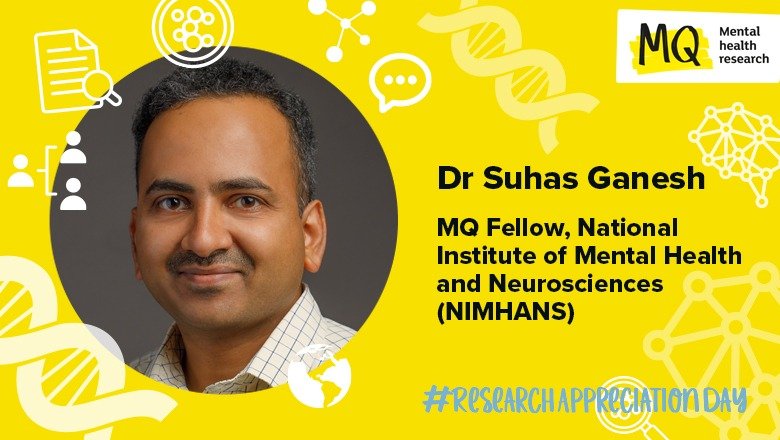Research Appreciation Day: Introducing Dr Suhas Ganesh

On 5 July, MQ Mental Health Research invites you to join us in celebrating Research Appreciation Day. This is the first time we’re celebrating with this awareness day just how important research is in our society. In the run up to the day, we’re celebrating a few of our recent research fellows so you can get to know the incredible people devoting their lives to making our world better through research.
Research Appreciation Day – Introducing Dr Suhas Ganesh
Name: Suhas Ganesh, National Institute of Mental Health and Neurosciences (NIMHANS) India
Career background: MD in Psychiatry
Current research: Genetic and environmental determinants in mental health
Why did you first become interested in research?
Human behaviour (including my own) has fascinated me for as long as I can remember. It was only during my undergraduate medical training that I became convinced I should be pursuing my quest as a formal field of study. Hence, I was drawn to the field of Psychiatry.
Once into residency, it soon became clear that unlike the syndromes involving brain development where a concern with one gene almost fully explained the problem, a cause in psychiatry was not simple. It could be one gene, a few genes, several hundred genes but none of these would themselves suffice in explaining the illness.
More often than not, the sources of cause in a psychiatric illness were so wide ranging that they traversed individual biology, families, societies, cultures and almost everything under the sun including the unknowns. Understanding this complexity seemed like a near impossible task, and yet, tempting enough to begin a career in research.
What’s the day-to-day life of working in research?
If the practical life of being a researcher may be summarised in fewest words – ‘embracing uncertainty’ would capture it the best.
While the big questions of science (‘the impact of genes and environment on mental health’ in my case) are larger goals, the way to solve these often involve asking simple, practical questions with falsifiable hypotheses to test.
Each experiment designed to solve the simple question may or may not lead to results in support of solving the larger question. But this unending quest, sometimes even seeming to be drudgery, is what most days in research look like.
What’s your favourite part of a study?
While every part of a study from designing, data collection, curation, analysis, and publication, become part of everyday life in research, there are two moments that are particularly the most enjoyable.
First, when I synthesize all the available information usually after several hours of brooding over literature, there occurs a moment when the mind comes up with a hypothesis that has a natural character of worthiness of being tested.
The second such moment occurs when all the data collected over several months of laborious effort are finally ready to actually test the hypotheses. These to me are the most enjoyable moments irrespective of the research outcome.
What has it been like to work with MQ?
When MQ announced the theme of ‘reducing premature mortality in mental illnesses’ it was a dream come true as I had been working on understanding genetic risk of antipsychotic related side effects and had most of the material ready to submit a proposal.
Of course, research needs funding. In addition to financial support, the process of review from peers and their feedback serve important functions of enabling good quality research.
While I had a very slight hope of actually getting funded, I also had a strong conviction that this work was important. The most joyous moment was when an email came from the grants officer after the final interview. Somehow even before I could read the subject-line there was a feeling that it was going to be good news. And it indeed was!
Here, I should acknowledge and thank my wife (also a clinician-researcher working on brain stimulation) for introducing me to MQ and motivating me to pursue it with a proposal. This was one of the difficult moments in research where I had almost lost hopes of obtaining funding and was strongly considering pursuing clinical work exclusively. Thanks to her and to MQ, now I am able to pursue research in a field that I am passionate about.
It is generally difficult for a researcher from the global south to believe that a proposal to carry out research in their home countries will be funded by a prestigious award such as the MQ: Fellows award. I felt both fortunate and privileged when I received the funding news from MQ. The joy was further doubled when I learnt that this was the agency’s first award in India.
What do you wish people knew about research?
I think the biggest misconception about research is that obtaining positive results takes precedence over everything else.
Research for me has always meant unrelenting pursuit of approximations of truth using the best methods available at any given time point. Hence, the methods and the labour take precedence our results and the consequences of those results.
Why does research matter?
Methods in science are not perfect, but these are the best tools at our disposal for moving towards truth. Research involves rigorous application of this scientific method. And the outcomes of scientific discovery have the greatest chance of leading to the greatest public good. While these are open to refinement, at any given moment these have the best chance of better understanding of the world around us.
Source link
#Research #Appreciation #Day #Introducing #Suhas #Ganesh

